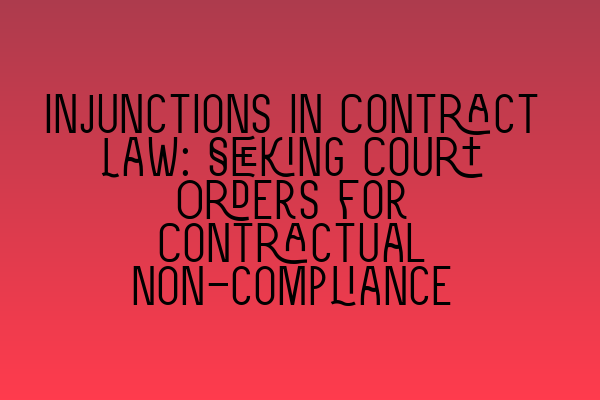Injunctions in Contract Law: Seeking Court Orders for Contractual Non-compliance
Introduction: In the complex world of contract law, disputes and breaches of contract are unfortunately all too common. When one party fails to fulfill their obligations as outlined in a contract, it can have serious implications for the other party. In such cases, seeking an injunction is often the most effective legal remedy. In this article, we will explore the concept of injunctions in contract law, their purpose, and how they are obtained.
What is an Injunction in Contract Law?: An injunction is a court order that compels a party to either cease a specific action or fulfill a specific obligation. In contract law, injunctions are sought when one party wants to prevent the other party from engaging in certain activities that would violate the terms of the contract. They can be used to enforce the terms of a contract, stop a party from breaching the contractual obligations, or prohibit certain behaviors that could cause irreparable harm to the other party.
Purposes of Seeking an Injunction: There are several reasons why parties seek injunctions in contract law cases. Some of the key purposes include:
1. Enforcing Specific Performance: If one party fails to fulfill their contractual obligations, the injured party can seek an injunction to compel the breaching party to perform specific duties as agreed upon in the contract.
2. Preventing Breach or Damage: In some cases, a party may seek an injunction to prevent the other party from breaching the contract or causing damage that cannot be adequately compensated through monetary damages. This can include actions such as disclosing confidential information or using trade secrets in violation of the contract.
3. Protecting Intellectual Property: If a contract involves the transfer or licensing of intellectual property, an injunction may be sought to prevent unauthorized use, reproduction, or distribution of the intellectual property.
4. Preserving the Status Quo: In certain situations, the injured party may seek an injunction to maintain the status quo until the dispute is resolved. This can be particularly important in situations where irreversible harm may occur if immediate action is not taken.
Obtaining an Injunction: Seeking an injunction in contract law requires going through a legal process that typically involves the following steps:
1. Identifying the Breach: The first step is to identify the breach of contract and clearly demonstrate how the other party’s actions are in violation of the agreement. It is important to gather all relevant evidence to support the claim.
2. Drafting a Complaint: A complaint needs to be drafted, outlining the specific details of the breach and the requested relief. This document should clearly state the grounds for the injunction and provide supporting legal arguments.
3. Filing the Lawsuit: The complaint, along with any supporting documentation, needs to be filed with the appropriate court. It is important to follow all procedural requirements and deadlines to avoid any potential dismissals.
4. Presenting Evidence: Once the lawsuit is filed, both parties will have the opportunity to present their evidence and arguments before the court. This may involve witness testimony, expert opinions, and any relevant documents that support the case.
5. Decision and Enforcement: After considering all the evidence and arguments, the court will make a decision regarding the injunction. If granted, the party seeking the injunction will need to ensure that it is enforced, typically by providing a copy of the court order to the breaching party.
Conclusion: Injunctions in contract law play a vital role in ensuring that the terms of a contract are upheld and that parties are held accountable for their obligations. When seeking an injunction, it is crucial to carefully prepare the case, present compelling evidence, and follow all legal procedures. Working with an experienced contract law attorney can help navigate the complexities of obtaining an injunction and maximize the chances of a successful outcome.
Remember, if you find yourself in a situation involving contractual non-compliance, seeking legal advice at the earliest possible stage is essential. Injunctions can be a powerful tool in protecting your rights and interests, ensuring that the terms of your contract are respected, and providing a swift resolution to any contractual disputes.
